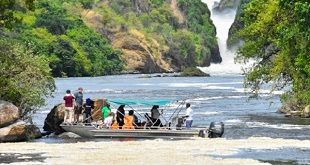
Tourists who visit the center also have a chance not only to buy these souvenirs but also interact with locals and share their respective ways of life.
For example, when this writer visited Red Rocks center at the outskirts of Musanze town, a group local women were busy teaching some tourists how to weave baskets, and making traditional banana beer known as urwagwa that they later sat around and drank together.
During the night, some local community members sat around a bonfire with the tourists where they shared their respective stories from their own countries.
“Each country is unique and has its own story. When we come to Rwanda, we want to hear Rwanda story as told by the local community, and not what we read from papers. It gives us a deep insight about the cultural and social life of Rwandans, their struggles and their hopes,” said Juttah Sauer, a German tourist who spent two days at Red Rocks.
A community member, John Busingye, explained that before he got his training at Red Rocks center where he is now a resident visual artist, he used to earn his living as a poacher.
“It was a perilous life earning my living as a poacher since most of the times we would get caught by the long arm of the law. But since I started doing my arts here, after getting intensive training, I have left that life behind and I am now living a profitable life. The training and the chance to work here really changed my life,” says Busingye.
Red Rocks also involves the community in eco-tourism where they emphasise environmental conservation.
Bakunzi adds that the art and craft made from Red Rocks are derived from natural raw materials, and therefore are not harmful to the environment.
“We have to come up with different initiatives that help to sustain the livelihood of local community. Ours is a symbiotic relationship where we give them a chance to earn a living while they help us to protect the environment which is critical for tourist attraction,” says the tour operator.
He adds: “We are basically tour operators. However, we contribute to the local tourism industry by facilitating safaris and community based tourism around our home town. At the Red Rocks Intercultural Exchange and Backpackers’ Campsite, one can come and participate in community tourism while having a place to stay, like mountain hiking, biking, cycling, and basket weaving, among others.”
Amahoro Tours also made Rwanda proud this year when it won top 100 Green Destination in the world, an achievement that Bakunzi says was as a result of hard work they had embarked on in the past to promote responsible tourism.
****
editor@independent.co.ug
 The Independent Uganda: You get the Truth we Pay the Price
The Independent Uganda: You get the Truth we Pay the Price


